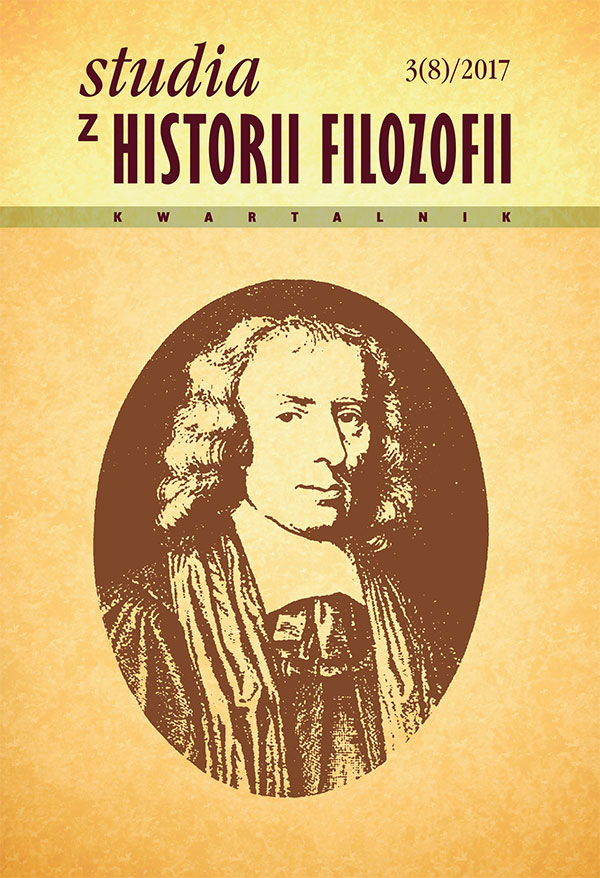The Concept of Grace in Ralph Cudworth’s Unpublished Freewill Manuscripts
DOI:
https://doi.org/10.12775/szhf.2017.030Słowa kluczowe
Ralph Cudworth, wolna wola, łaska Boża, moralnośćAbstrakt
Pojęcie łaski w niepublikowanych rękopisach Ralpha Cudwortha na temat wolnej woli
Wedle Cudwortha warunkiem możliwości moralności jest Boża miłość, zaś rzeczywistą prawość osiągnąć można nie za pomocą samej tylko wolnej woli, gdyż musi jej towarzyszyć łaska Boża. W swych opublikowanych pracach Cudworth niewiele jednak pisze na ten temat. Inaczej rzecz przedstawia się w niepublikowanych dotychczas rękopisach, zwłaszcza dużej ich kolekcji poświęconej wolnej woli (British Library Additional MSS 4978-4982). Badania tego, co Cudworth ma tam do powiedzenia na temat łaski Bożej, pozwalają na stwierdzenie, że pomimo tego, iż stara się tam szczegółowo uzasadnić konieczność łaski, usiłuje zarazem zadowalająco uzasadnić twierdzenie, że powodowane wolną wolą ludzkie wysiłki są jedynie koniecznym, ale nie wystarczającym warunkiem osiągnięcia moralnej słuszności. Zgodnie z tym obrazem szczególna łaska, pojmowana jako moc wkraczająca z zewnątrz w ludzkie życie i usposabiająca je do moralnej dobroci, jest czyś zbytecznym. Explicite Cudworth może co prawda twierdzić, że łaska jest czymś koniecznym, może tak jednak być jedynie za cenę sprowadzenia szczególnej łaski do poszczególnych łask „naturalnych” (w tym ludzkiej wolnej woli), stworzonymi przez Boga mocą ogólnej opatrzności.
Bibliografia
Armour, Leslie. ‘Trinity, Community, and Love.’ In Platonism and the Origins of Modernity: Studies on Platonism and Early Modern Philosophy, edited by Sarah Hutton and Douglas Hedley, pp. 113–30. Dordrecht: Springer, 2008.
Carter, Benjamin. “The Little Commonwealth of Man”: The Trinitarian Origins of the Ethical and Political Philosophy of Ralph Cudworth. Leuven, Belgium: Peeters, 2011.
Cudworth, Ralph. The True Intellectual System of the Universe. London, 1678. Facsimile reprint Stuttgart–Bad Canstatt: Olms, 1964.
Cudworth, Ralph. A Treatise Concerning Eternal and Immutable Morality and a Treatise of Freewill, edited by S. Hutton. Cambridge: Cambridge University Press, 1996.
Darwall, Stephen. The British Moralists and the Internal ‘Ought’, 1640–1740. Cambridge: Cambridge University Press, 1995.
Furst, Alfons. ‘Autonomie und Menschenwurde. Die Origeneische Tradition.’ In Autonomie
und Menschenwürde: Origenes in der Philosophie der Neuzeit, edited by Alfons Furst and Christian Hengstermann, pp. 26–38. Munster: Aschendorff, 2012.
Gill, Michael. The British Moralists on Human Nature and the Birth of Secular Ethics. Cambridge: Cambridge University Press, 2006.
Kobusch, Theo. ‘Die Idee der Freiheit. Origenes und der Neuzeitliche Freiheitsgedanke’. In Autonomie und Menschenwürde: Origenes in der Philosophie der Neuzeit, edited by Alfons Furst and Christian Hengstermann, pp. 70–79. Munster: Aschendorff, 2012.
Leech, David. ‘Cudworth on Superintellectual Instinct as Inclination to the Good.’ British Journal for the History of Philosophy 25, no. 5 (2017), pp. 954–970.
More, Henry. An Account of Virtue, or, Dr. Henry More’s Abridgment of Morals. Trans. by Edward Southwell. London: printed for B. Tooke, 1690.
More, Henry. Enchiridion Ethicum. London: J. Flesher, for William Morden, 1667.
Origen. Origenes Contra Celsus libri octo: ejusdem Philocalia, trans. William Spencer. Cambridge, 1658.
Passmore, John. A. Ralph Cudworth. An Interpretation. Cambridge: Cambridge University Press, 1951.
Rees, B. R. Pelagius: Life and Letters. Vol. 1. Pelagius: A Reluctant Heretic. Suffolk: Boydell Press, 1998.
Pobrania
Opublikowane
Jak cytować
Numer
Dział
Statystyki
Liczba wyświetleń i pobrań: 530
Liczba cytowań: 0



